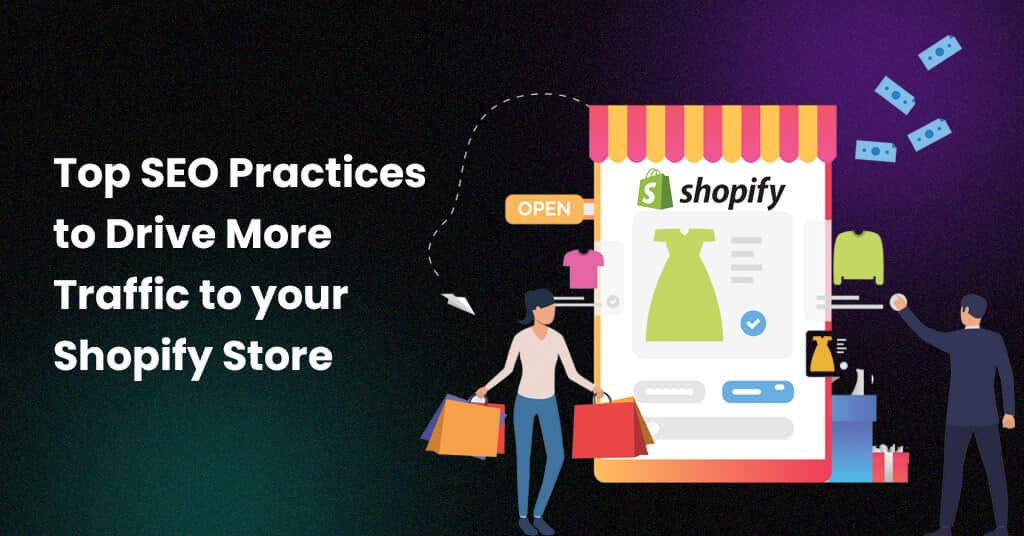
Did you know that 49% of online shoppers start their product search with search engines like Google? That’s a staggering number of potential customers starting their shopping journey with a simple search. But here’s the question: Is your Shopify store showing up in those search results? If not, you’re losing out on significant traffic and sales.
With millions of online stores competing for attention, visibility is crucial. Since many of these stores offer similar products as yours, what will set you apart? It’s the search engine ranking. The higher the rank, the more likely customers will find and choose your store over competitors.
This blog post will guide you through how to get traffic to your Shopify store with proven SEO techniques. You’ll learn:
- How to research and implement the right keywords
- Ways to optimize your product descriptions and images
- Strategies for improving your site’s loading speed
- Techniques for building high-quality backlinks
- Methods to leverage local SEO to connect with nearby customers
Each section will provide actionable steps you can take to start improving your store’s search engine ranking.
Unlock SEO for Shopify: 5 Proven Strategies
Elevate your store’s search engine ranking with tried-and-tested SEO techniques. Mastering these will help drive organic traffic and boost your sales.
1. Keyword Research
Identifying the right keywords is the cornerstone of an effective SEO strategy. By targeting the most relevant keywords, you can ensure your store appears before potential customers when they search for your products or services. Here are some key considerations:
- Keyword Research Tools: Google Keyword Planner, SEMrush, Ahrefs, Ubersuggest, and other similar tools can help identify keywords with high search volume and related terms.
- Understand Search Intent: Analyze the intent behind each search query to determine if users are looking to make a purchase, gather information, or fulfill some other need. This will help you create content accordingly.
- Competitor Analysis: Examine the keywords your competitors are ranking for and look for opportunities to target those for higher rankings in your niche.
- Long-Tail Keywords: In addition to broad, high-volume keywords, identify and target long-tail keywords (more specific, multi-word phrases).
- Keyword Mapping: Once you have a robust list of relevant keywords, map them to specific pages, products, or content on your Shopify store.
2. On-Page SEO
Optimizing the on-page elements of your store is crucial for improving search visibility and user experience. Here’s what to focus on:
- Keyword-Optimized Product Pages: Incorporate relevant keywords into your product titles, descriptions, and other content to help search engines understand what each page is about.
- Unique and Valuable Content: Create high-quality, informative product descriptions, category descriptions, and blog content that provides value to your visitors.
- Optimized Images: Compress images for faster load times, use descriptive file names, and include relevant alt text to improve image searchability and accessibility.
- Clean URL Structure: Keep your URLs short yet descriptive, and include relevant keywords, making it easier for users and search engines to understand the page’s content.
- Proper Heading Structure: Utilize heading tags (H1, H2, H3, etc.) to organize your content hierarchy and signal importance to search engines.
- Strategic Internal Linking: Link to related products, categories, and content to help search engines better understand your site’s relationships and structure.
3. Technical SEO
It focuses on optimizing the non-content elements of your site to ensure search engines can easily crawl, index, and render your pages. Key technical SEO practices include:
- Mobile Optimization: With mobile eCommerce sales hitting $2.2 trillion in 2023, ensuring your store is mobile-friendly is essential for providing a seamless user experience and meeting Google’s requirements.
- Site Speed Optimization: A slow-loading website can lead to higher bounce rates and impact your rankings. Tools like Google’s PageSpeed Insights can help identify areas for improvement.
- Secure Connection (HTTPS): Implement an SSL certificate and serve your site over HTTPS to enhance security and build trust with both users and search engines.
- XML Sitemaps: Create and submit an XML sitemap to search engines to help them understand your site’s structure and discover all your important pages.
- Crawl Management: Identify and fix crawl errors, broken links, and other issues to improve crawlability and prevent potential ranking penalties.
4. Link Building
Acquiring high-quality backlinks from reputable websites is an important factor in improving your search engine rankings. Here are some effective strategies to build a strong backlink profile.
- Content-Driven Link Building: Create valuable, shareable content like in-depth guides, research studies, or industry reports that other websites will want to link to naturally.
- Guest Blogging: Reach out to relevant blogs and websites in your niche to pitch guest post ideas. When contributing guest posts, include a contextual link back to your store or a specific product page.
- Broken Link Building: Identify broken links on authoritative sites related to your products or industry, and offer to replace the dead links with relevant content from your store.
- Resource Page Link Building: Search for resource pages in your niche and pitch your best content, products, or tools to be included as a valuable resource.
- Influencer Collaborations: Partner with influencers or industry experts to create co-branded content, product reviews, or other collaborations that can earn you quality backlinks.
5. Local SEO
If your Shopify store has a physical presence or caters to a specific geographic area, optimizing for local SEO can be a powerful way to drive both foot traffic and online sales from nearby customers. Key local SEO tactics include:
- Google My Business Optimization: Set up and verify your GMB listing with correct business details.
- Consistent NAP Citations: Maintain consistent information (name, address, contact number) across all online directories, listings, and citations.
- Localized Content: Incorporate location-specific keywords and information into your website’s content, such as city or neighborhood names, to signal relevance.
- Customer Reviews: Encourage satisfied customers to leave reviews on your GMB listing, as well as other popular review platforms for trust building.
- Local Link Building: Pursue backlink opportunities from locally relevant websites, such as community organizations, local blogs, or event listings.
Don’t Settle for Page 2 Obscurity
- High-ranking sites on the first page of Google receive 95% of web traffic
- The top result alone gets 33% of all clicks
Measuring SEO Success
To gauge the effectiveness of your SEO efforts and identify areas for improvement, it’s crucial to track and analyze the right metrics. Leverage tools like Google Analytics and Google Search Console to monitor the following key performance indicators (KPIs):
- Organic Traffic
- Bounce Rate
- Conversion Rate
- Keyword Rankings
- Click-Through Rate (CTR)
- Average Session Duration
By regularly analyzing these metrics and identifying trends or areas of concern, you can continually refine and optimize your Shopify store’s SEO strategy for maximum impact.
Signs that you May Need the Assistance of Shopify SEO Professionals
While some aspects of SEO can be managed in-house, there may be situations where partnering with experienced professionals can provide significant advantages. Here are some instances when Shopify store SEO experts can be of great help.
- Lack of time or resources: If you’re already stretched thin running your business, dedicating the time and effort to implement SEO strategies can be challenging.
- Complex technical issues: Some technical SEO tasks, such as site migrations or addressing crawling issues, may require specialized knowledge and expertise.
- Highly competitive niche: In highly competitive industries, it can be difficult to outrank established competitors without professional SEO strategies.
- Stagnant or declining organic traffic: If your organic traffic isn’t growing or has started to decline, an SEO expert can help identify and address the underlying issues.
- Limited results from current efforts: Despite your best attempts, you’re not seeing significant improvements in rankings or traffic.
- Expanding to new markets: You’re targeting new geographic regions or languages and need localized SEO strategies.
- Algorithm update impacts: Major search engine algorithm changes have negatively affected your rankings.
A professional Shopify search engine optimization expert or agency can provide targeted solutions, helping your store overcome obstacles and achieve sustainable growth in organic search.

The Benefits of Hiring a Shopify Store SEO Expert
- Specialized Knowledge: SEO professionals have deep expertise and employ proven strategies for your business, often resulting in more effective SEO implementation.
- Adaptability to Algorithm Changes: Search engines frequently update their algorithms. SEO experts stay current with the changes, adjusting tactics to maintain rankings.
- Tailored Strategy: Professionals develop a comprehensive SEO plan specific to your Shopify store, aligned with your business goals and target audience.
- Focus on Core Business: Outsourcing SEO frees up your time and resources, allowing you to concentrate on critical business areas.
- Advanced Tools and Analytics: SEO agencies have access to premium tools and in-depth analytics, providing deeper insights into your store’s performance and opportunities.
- Network and Relationships: Established professionals have connections with industry publishers, bloggers, and other site owners, which can help in building quality backlinks.
- Scalability: As your business grows, professional Shopify store optimization services can scale with you, addressing new challenges that come with expansion.
- ROI-Driven Approach: Experts focus on metrics that matter – not just traffic, but conversions, revenue, and return on investment.
While there is an upfront cost, partnering with SEO professionals can lead to long-term benefits, sustainable growth, and a stronger online presence for your Shopify store.
Ready to Boost your Shopify Store’s Visibility?
Don’t let your products go undiscovered. Our SEO experts are here to help your store reach its full potential. Start with a free SEO audit and discover untapped growth opportunities. We’ll analyze your current performance, identify quick wins, and outline a roadmap for long-term success.
Or, if you prefer, try our Shopify search engine optimization services with a no-obligation trial period. See firsthand how our tailored strategies can drive more qualified traffic to your store. Take the first step toward SEO success—contact us today and let’s get your products in front of the right customers.

